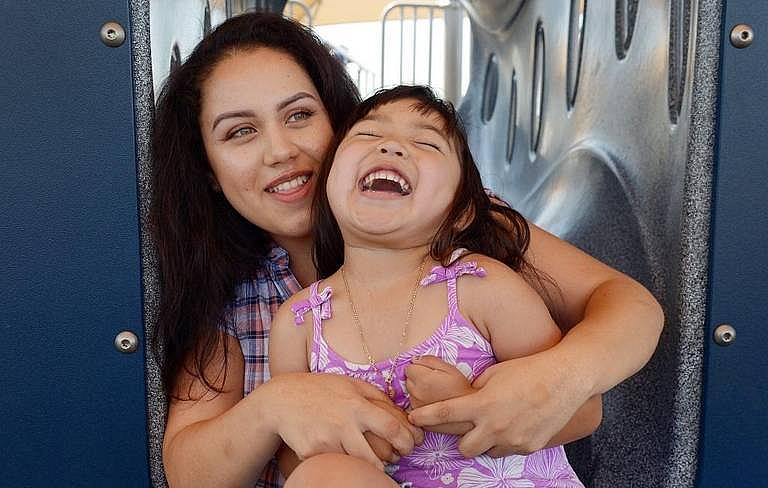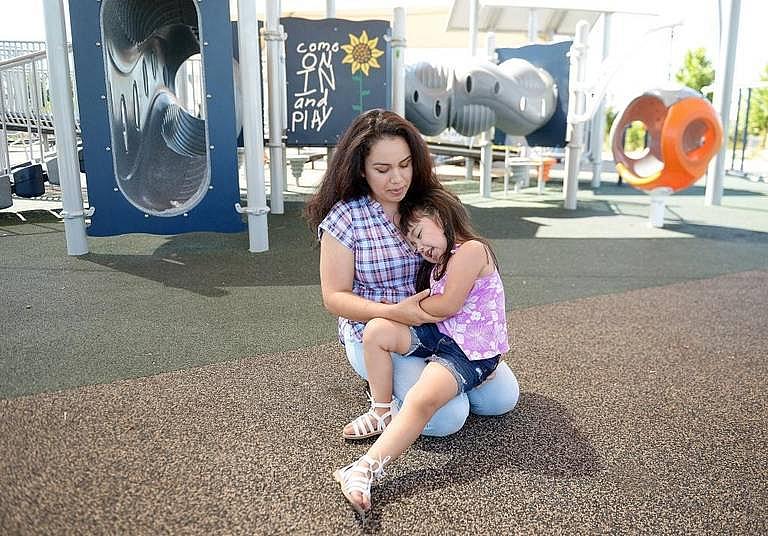At 14, she was told to hide her baby bump and switch schools. Her shaming wasn’t unique
This is the first in a series about sex education and teen pregnancy, and is produced as a project for the USC Center for Health Journalism’s California Fellowship.
Other stories in this series include:
Why are birth rates higher for Latina teens than others? It’s complicated, experts say
Sex education is now the law, but conservative school leaders aren’t happy about it
This teen mom and her newborn rode a city bus to a school for delinquents. Here’s why
After reading teen mom’s story, strangers wanted to help. And they delivered.

Graciela Pacheco plays with her daughter, Alyssa Sherlynne, during a visit to Inspiration Park in Fresno on June 1, 2017. Between pushes down the slide, Pacheco quizzes her daughter. “What’s a noun?” Pacheco asks. The 3-year-old quickly replies, “Person, place or thing.” Craig Kohlruss
Graciela Pacheco didn’t know she was pregnant until she was six months along. At 14 years old, she couldn’t differentiate the bodily changes that come with puberty from the signs that a baby was growing inside her.
Toothpaste started making her sick. Her favorite foods didn’t taste good anymore. It wasn’t until her final trimester that she started to physically show. Rapidly, her 110-pound frame gained 70 pounds.
“I was like a flower,” Pacheco, now 18, says, forming her hands into an imaginary, unstoppable bloom.
It was then she says her presence at Glacier Point Middle School in Fresno became a problem.
A school counselor said she should skip eating lunch in the cafeteria to avoid the crowd – and the gossip. She was told to wear extra layers to hide her belly bump, despite Fresno’s scorching heat. Near the end of the 2013 school year, it was recommended she transfer to an alternative school for adults.
Advocates say that Pacheco’s story of a lack of support is reflective of a bigger problem in the San Joaquin Valley, where teen birth rates are still disproportionately high despite statewide and nationwide declines. Six of the 10 counties with the highest teen birth rates in California are located in the Valley.
The California Healthy Youth Act was passed in 2016, and requires that students learn unbiased and medically accurate sex education, including lessons on abortion. Research shows that comprehensive sex education means less teen pregnancies, but there are concerns about how well the new law will be implemented in the politically conservative Valley, which has a history of push-back against such lessons.
“Sex has been such a taboo message here. There are still a lot of school districts that are in denial about the law, that say they will decide what goes on in their classrooms,” said Socorro Santillan, executive director of Fresno Barrios Unidos – an organization that has been working to prevent teen pregnancy since 1994. “It’s difficult for parents to talk about, nevertheless somebody who is a stranger. The conversations that we assume are happening at home are not, and because everybody is just assuming that teens are getting this information somewhere, nobody is actually giving it to them. This is why we’re ending up with a high number of teen pregnancies.”
Pacheco says her teachers never taught her about sex. She learned most of what she knows about sex from her next-door neighbor – a 15-year-old boy she met when she was 12, who would become the father of her child the same year she lost her virginity.
“I think about that all the time. Maybe sex ed would have stopped this,” she said. “But I’m a mother now.”
‘Old enough to do it’
When she was 16, Pacheco would make frequent trips to the Walmart in Fresno to search the floor.
“I was looking for quarters, pennies, anything,” she said. “I was always paying for bags of diapers in change.”
Pacheco, today a student at Fresno City College with bright green eyes, looks back in disbelief at her own will to persist. Now the mother of a 3-year-old, she wonders if the adults in her life failed her when she was younger.
She has a tumultuous relationship with her mother, who has kicked her out of the house more than once since she got pregnant. She has no relationship with her father. She says her school counselor’s advice to leave her high school made her more vulnerable to failure, putting her on a path that could have ended up much differently.
At 17, she graduated early from the Central Learning Adult School Site. Known as CLASS, the school offers a program where students meet with a teacher once a week “to earn credits and receive additional material,” according to its website.
“I didn’t sleep. I would take packets and packets of work home, and whenever my daughter was sleeping, I would do the work,” she said. “I come from nothing. On paper, I still am nothing. I know education is the way out, and I feel like with school, I could do that.”
Pacheco is taking classes through the summer with goals of becoming a Spanish/English translator. She picks up shifts in-between as a server at Panda Express. The mother of her so-called “baby daddy” helps watch her daughter, Alyssa Sherlynne.
Graciela Pacheco sits with her daughter Alyssa Sherlynne during a visit to Inspiration Park in Fresno on June 1, 2017. Later, Pacheco says, “I’m trying to keep it together because Sherlynne is watching me, but it’s hard to always be the strong one. I’m her mom and her dad. I have to provide for her and nurture her and teach her right from wrong.” Craig Kohlruss
She remembers the day she took a pregnancy test with a friend. Amid the rush of panic, the 14-year-old started planning to raise the child, despite recommendations from her fellow middle-schoolers to get an abortion and a suggestion from her favorite teacher to consider adoption.
“My first thought was, ‘Dang, I’m going to give this baby my life, and that’s exactly what I don’t want,’” she said. “I’m not going to lie. At one point, I thought it’s kind of selfish to keep this child, knowing where I come from. But I thought I was old enough to do it, so I should be old enough to take care of my kid.”
Pachecho’s life hasn’t been easy. At 15, she had to stand before a judge and fight for her daughter, after her ex-boyfriend unsuccessfully tried to get sole custody following a messy breakup.
“I can’t say he’s a bad dad. He’s so young. I can’t expect much from him,” she said of the man three years her senior. “I make that excuse for him.”
In May, Pacheco’s car broke down. She hid in her mother’s garage to cry after she smashed open the piggy-bank she had designated as Sherlynne’s college fund in order to pay for the repairs.
Earlier this month, Pacheco was living at the Economy Inn in Fresno. After feeling unsafe in her mother’s home, she packed clothes for her and her daughter and fled. The Fresno County Department of Social Services offered to pay for a hotel room for seven days until she found permanent housing, but after that, she would be on her own again.
“I’m trying to keep it together because Sherlynne is watching me, but it’s hard to always be the strong one. I’m her mom and her dad. I have to provide for her and nurture her and teach her right from wrong. It’s a lot,” Pacheco said through tears. “When I get an hour to myself, that’s when I cry. I can’t let her see me.”
Pushed out
According to a 2016 report from the California Department of Public Health, Kern County has the highest teen birth rate in the state, with 45 out of 1,000 girls having babies. The next highest teen birth rates are in Imperial, Tulare, Madera, Del Norte, Fresno, Kings, Monterey, Merced and Lake counties, respectively.
In 2012, a total of 2,891 teens gave birth in Fresno, Madera and Tulare counties. A reportfrom the American Civil Liberties Union in 2015 found that teen moms in the three counties reported feeling “pushed out” of their schools by educators’ shaming behavior.
“Parenthood can be a positive motivator for young parents. However, stigmatizing behavior of staff can create a barrier to education for pregnant and parenting students that is discriminatory and pushes them out of school,” the report says.
Jennifer Chou, a reproductive justice attorney with the ACLU of Northern California, has heard stories like Pacheco’s, and said compliance with the California Healthy Youth Act is crucial.
“With pregnant and parenting students in the Central Valley, that’s one of the stories we hear a lot. There’s a level of discomfort with issues around reproductive health care, and that manifests itself in the push-out of young parents, and stigmatizing them,” Chou said. “There’s just this hesitancy to talk about it. And unintended pregnancy is just one of the consequences of not having medically accurate, complete sex ed.”
"There’s a level of discomfort with issues around reproductive health care, and that manifests itself in the push-out of young parents." — ACLU attorney Jennifer Chou
A spokeswoman for the Central Unified School District didn’t comment on Pacheco’s case, but said the district offers a slew of support services to teen parents and complies with state and federal laws that protect them. According to Title IX, a school can provide information to its students about an alternative program, but it can’t pressure a pregnant student to attend. A pregnant student must be allowed to remain in her regular school if that’s what she wants.
“The goal of Central Unified is to keep teen parents enrolled in their schools of attendance while also protecting their privacy and promoting their well-being as well as that of their children,” CUSD spokeswoman Sonja Dosti said.
On her Facebook page, Pacheco has “being an amazing mother” listed as her occupation. Playing with Sherlynne at Inspiration Park last month, she quizzes her between pushes down the slide.
“What’s a noun?” Pacheco asks. The 3-year-old quickly replies, “Person, place or thing.”
The two of them wear matching necklaces: separate gold halves of a single heart that fit together like puzzle pieces. The necklaces say “always together, never apart” in Spanish.
In the hotel room that had become her temporary home, Pacheco started to worry about how she would have time to go to class while also trying to find a liveable apartment. How will she make enough money to pay rent?
The motto she’s had for the past four years chimed in her head: What about Sherlynne?
“Every decision I make – every time I want to ditch class, I say, ‘What about Sherlynne? Some teen moms make it happen, some don’t. But don’t be biased. Because some of us are really trying.”
[This story was originally published by The Fresno Bee.]

